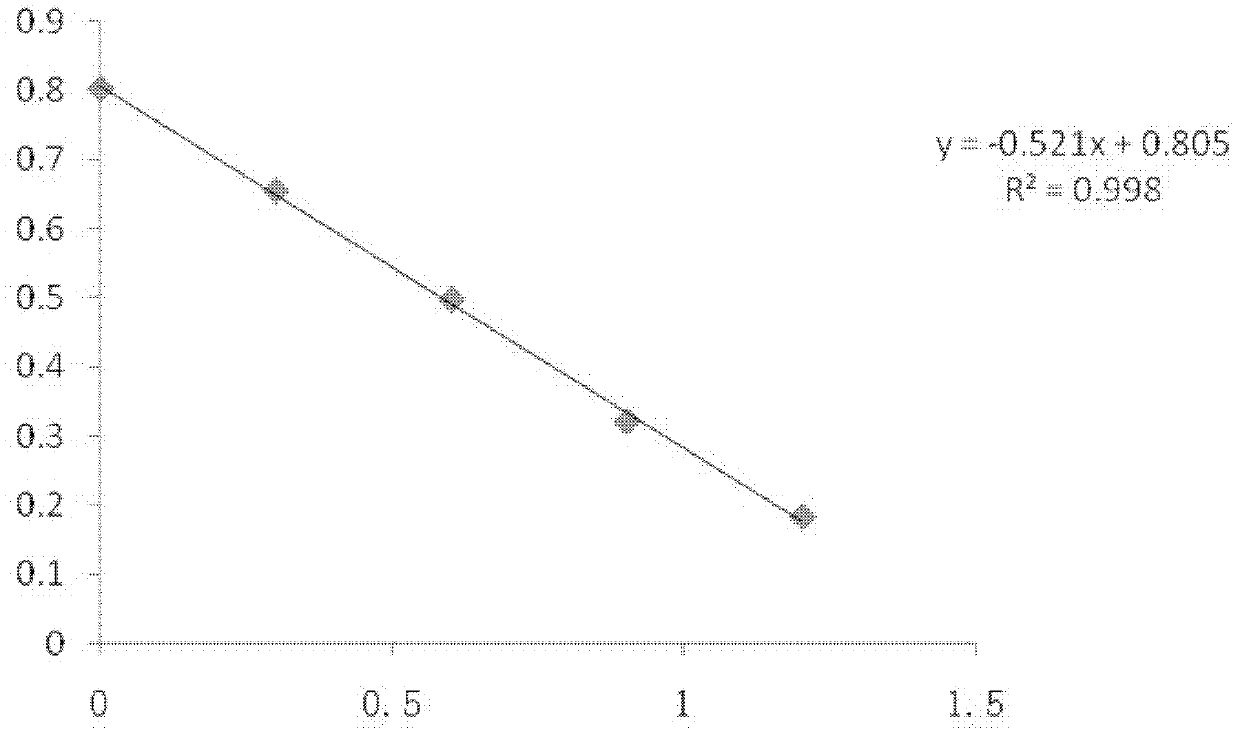Gene engineering antibody for kitasamycin residue detection, and preparation method and application thereof
A technology of genetically engineered antibodies and kitasamycin, which is applied in the directions of genetic engineering, botany equipment and methods, biochemical equipment and methods, etc., can solve the problems of unobtained patent documents, achieve easy production, high detection accuracy, reduce The effect of fees
- Summary
- Abstract
- Description
- Claims
- Application Information
AI Technical Summary
Problems solved by technology
Method used
Image
Examples
Embodiment 1
[0025] Example 1: KA / 2A9 cell line phage antibody library construction
[0026] Take the monoclonal hybridoma cell line KA / 2A9 preserved in liquid nitrogen (the hybridoma cell line KA / 2A9 is preserved in the China Center for Type Culture Collection, and its preservation number is CCTCC NO: C201184), and quickly thaw it in a water bath at 40°C. Dissolve 10ml RPMI-1640, centrifuge the cells horizontally at 1000rpm, discard the supernatant, pipette 1ml Trizol (Invitrogen, USA) into a centrifuge tube, invert up and down to mix well, and let stand at room temperature (20-25°C, the same below) for 5min. Add 400 μL of chloroform, shake vigorously for 15 s, and place at room temperature for 10 min. Centrifuge at 12000r / min at 4°C for 10min, and three layers can be seen at this time. Carefully take 600 μL of the supernatant, transfer it to a new EP tube, and add 600 μL of pre-cooled isopropanol. Inverted to mix, room temperature for 10min. Centrifuge at 12000r / min at 4°C for 10min. ...
Embodiment 2
[0044] Example 2: Specific antibody screening
[0045] Take 200 μl of the cryopreserved library and add it to a 250mL Erlenmeyer flask, add 50mL 2×YT-AG liquid medium (100mg / L and 2% (mass percentage) glucose), and culture at 37°C and 250r / min until OD600=0.8. Take 2×1010 M13K07 helper phage (NEB, USA) and add it to the bacterial solution. Incubate at 37°C, 250r / min for 1h. Centrifuge at 1000g for 10min, and carefully aspirate the supernatant. The samples were resuspended in 20 mL 2×YT-AK (100, 50) liquid medium, and cultured overnight at 30°C and 250 r / min. Centrifuge at 1000g for 20min. The supernatant was transferred to a 100 mL centrifuge tube, precipitated with 50% PEG, and left to stand on ice for 1 h. Centrifuge at 10,000 r / min for 10 min at 4°C, and dissolve the precipitate in 3 mL of phosphate buffer.
[0046] Take a sterile immune test tube, add 3 mL of coating solution, and add 30 μl of 1 mg / mL kitasarmycin coating agent according to the final coating concentra...
Embodiment 3
[0052] Example 3: Soluble Expression of Single Chain Antibody
[0053] Pick a single colony on the plate and put it into 5mL 2×YT-AG liquid medium, and culture overnight at 30°C and 250r / min. The overnight culture was inoculated with 2×YT-AG liquid medium at a ratio of 1:10, cultured at 30° C. for 1 hour at 250 r / min, and centrifuged at 1500 g for 10 minutes. The precipitate was resuspended in 50mL 2×YT-AI liquid medium, and the expression was induced at 30°C and 250r / min for 6-8h. Centrifuge the bacterial solution at 1500 g for 20 minutes, resuspend the pellet in 2% bacterial solution volume TES, add 3% volume 1 / 5×TES, mix well, and ice-bath for 40 minutes. Centrifuge at 12000r / min for 10min, and the supernatant is the periplasmic cavity extract. After aliquoting in small volumes, store at -20°C.
[0054] The culture supernatant and the periplasmic cavity extract were taken respectively for potency ELISA determination. The periplasmic lumen extract and the culture superna...
PUM
 Login to View More
Login to View More Abstract
Description
Claims
Application Information
 Login to View More
Login to View More - R&D Engineer
- R&D Manager
- IP Professional
- Industry Leading Data Capabilities
- Powerful AI technology
- Patent DNA Extraction
Browse by: Latest US Patents, China's latest patents, Technical Efficacy Thesaurus, Application Domain, Technology Topic, Popular Technical Reports.
© 2024 PatSnap. All rights reserved.Legal|Privacy policy|Modern Slavery Act Transparency Statement|Sitemap|About US| Contact US: help@patsnap.com










